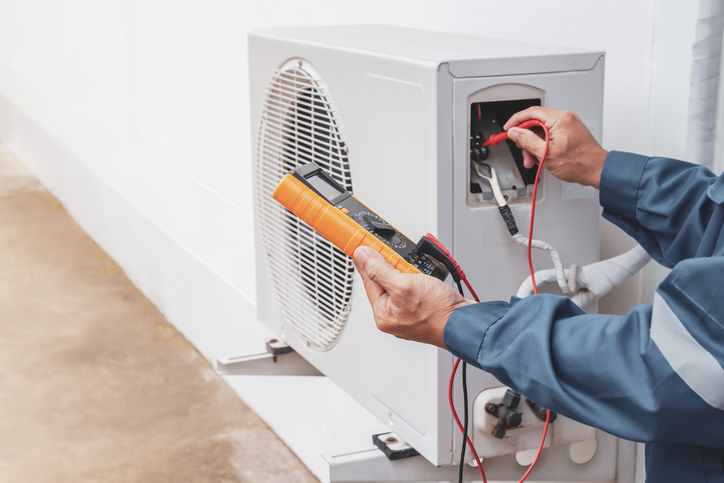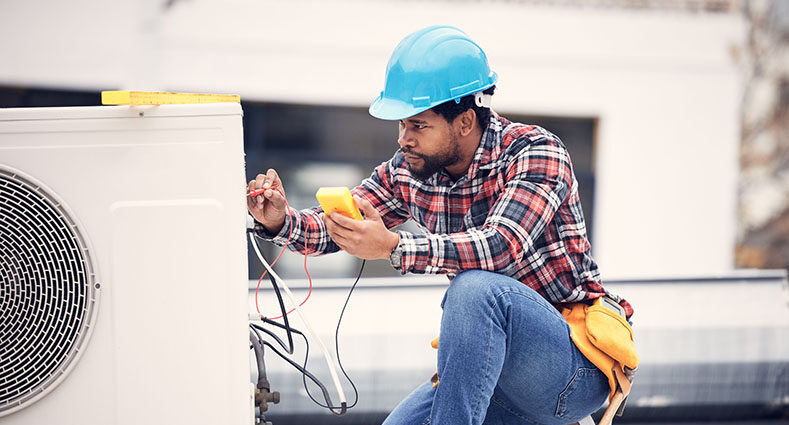How to perform a effective ac fix until the technician arrives
Wiki Article
All Regarding A/c: Identifying Common Issues and Effective AC Fixing Methods
Heating and cooling systems are vital for keeping interior convenience. Understanding their elements and performance is vital for determining usual issues. Property owners commonly deal with problems such as inefficient cooling, strange odors, or rising power costs. These indicators can suggest underlying concerns that may need focus. Exploring do it yourself troubleshooting strategies can be helpful, however understanding when to seek specialist assistance is just as crucial. What actions can be required to assure lasting efficiency?Comprehending Your A/c System: Components and Capability
An a/c system, frequently thought about the foundation of interior environment control, contains a number of crucial parts that collaborate to manage temperature level and air quality. The primary aspects consist of the heating device, ventilation system, and a/c unit. The home heating unit, generally a heater or central heating boiler, produces warmth during chillier months, while the cooling device cools down interior rooms during the summer.
Common A/c Troubles Property Owners Experience
Property owners frequently deal with a number of usual heating and cooling issues, consisting of inconsistent temperature level distribution throughout their living rooms. Furthermore, uncommon sounds during procedure can indicate underlying concerns that call for attention. Resolving these problems immediately is important for maintaining suitable system performance.Inconsistent Temperature Circulation
Numerous households experience the discouraging problem of inconsistent temperature level circulation, where specific spaces really feel uncomfortably warm while others stay also chilly. This problem typically emerges from a selection of variables, consisting of poor insulation, obstructed vents, or an improperly sized heating and cooling system. When ducts are not appropriately sealed or when furnishings blocks air movement, some areas might get not enough air conditioning. Additionally, thermostat positioning can considerably impact temperature level law; a thermostat situated in a sunlit area might misstate the general temperature level of your home. Normal upkeep, consisting of cleansing filters and guaranteeing ductwork is clear, can assist ease these disparities. Home owners might also think about zoning systems to better control temperature levels throughout different areas of the home, advertising a more comfy living setting.Uncommon Sounds Throughout Operation
When a heating and cooling system runs, uncommon sounds can suggest underlying concerns that call for focus. Home owners may encounter a variety of sounds, such as grinding, squeaking, or hissing. Grinding sounds usually signify worn-out bearings or elements, while squealing can recommend loose belts or components requiring lubrication. Hissing may suggest a refrigerant leak, which can compromise the system's performance. In addition, banging audios might point to loose ductwork or a concern with the blower fan. Each of these noises functions as a caution, prompting property owners to investigate further. Ignoring these indications can lead to more substantial troubles and pricey repair work. Regular maintenance and punctual attention to uncommon noises can improve system long life and efficiency, guaranteeing a comfy living atmosphere.Indications That Indicate Your A/c Demands Fixing
Exactly how can one tell if their air conditioning system needs repair? Several indications may suggest underlying issues needing specialist focus. If the A/c falls short to cool the space properly, it may recommend a cooling agent leakage or compressor breakdown. Furthermore, an increase in energy expenses without corresponding usage adjustments could indicate inadequacy in the system. House owners ought to also be sharp to uncommon smells rising from the system, which could suggest mold and mildew development or electric problems. In addition, if the air conditioning regularly cycles on and off, it may be an indication of a defective thermostat or various other mechanical problems. The visibility of water pooling around the device can suggest a clogged up drainpipe line. Recognizing these indications early can save time and money, making sure that the air conditioning system operates efficiently and properly.Do It Yourself Troubleshooting Techniques for Heating And Cooling Issues
When encountering a/c issues, property owners can utilize numerous do it yourself fixing techniques to identify the problem. Secret methods consist of inspecting thermostat setups, examining air filters, and examining drain problems. These steps can aid determine usual breakdowns before looking for expert support.Inspecting Thermostat Setups
What actions should homeowners take to ensure their thermostat setups are proper? First, they should confirm the thermostat is established to the wanted temperature level check over here and mode, whether home heating or air conditioning. Looking for a clear display screen and validating the thermostat is not set to "hold" or "vacation" setting is essential. Home owners need to also verify that the thermostat is degree and mounted in a place devoid of drafts, direct sunshine, or other temperature level influences. Additionally, rectifying the thermostat can assist offer precise analyses. If the thermostat operates on batteries, replacing them might solve any type of issues. By systematically reviewing these variables, house owners can typically recognize and rectify thermostat-related problems, promoting perfect HVAC system efficiency.Inspecting Air Filters
Air filters play a necessary function in keeping optimal heating and cooling efficiency. They catch dirt, irritants, and other bits, ensuring tidy air flow. With time, filters can come to be clogged up, minimizing air flow and performance. To evaluate air filters, people must initially find the filter, frequently discovered in the return duct or near the heating system. Once situated, they need to evaluate the filter's problem-- if it shows up dirty or discolored, it most likely needs replacement. Most filters require changing visit here every 1-3 months, depending on usage and ecological factors. Routine examination and prompt substitute of air filters not only improve air high quality but also extend the life-span of HVAC systems, protecting against potential malfunctions and pricey repair work.
Assessing Water Drainage Issues
Just how can home owners effectively determine and resolve water drainage issues within their heating and cooling systems? They must evaluate the condensate drain line for obstructions or obstructions, which can lead to water accumulation. Property owners may use a wet/dry vacuum cleaner to remove any type of particles blocking the line. Next, inspecting the drainpipe pan for corrosion or heating and airconditioning leakages is important, as a harmed frying pan can create water to overflow. Normal cleaning of the drainpipe line with a combination of vinegar and water assists prevent future clogs. Additionally, making sure correct slope of the drain line promotes effective water circulation. If these DIY strategies do not fix the problem, seeking advice from a professional HVAC technician may be essential to avoid prospective water damage and system failing.When to Call a Specialist for Air Conditioning Repair Services

While some a/c issues can be handled via DIY techniques, there are situations where calling a professional ends up being crucial. Home owners should look for skilled support when they experience consistent problems, such as insufficient cooling, unusual noises, or uncommon smells rising from the device. These signs and symptoms might show much deeper concerns that require specialized expertise and tools to detect and repair properly.

Preventative Upkeep Tips for HVAC Longevity
Normal preventative maintenance can considerably enhance the longevity of a/c systems. Property owners must set up yearly evaluations by certified technicians to evaluate system effectiveness and determine prospective issues. Routinely changing or cleansing air filters is crucial, as this warranties proper air movement and lowers strain on the system. Furthermore, inspecting and securing ductwork prevents power loss and improves overall efficiency.
It is additionally advisable to keep the outdoor system free from debris and plants, allowing for peak airflow and warmth exchange. House owners should check the condensate drainpipe for clogs to avoid water damages and mold and mildew development. Maintaining appropriate thermostat setups and utilizing programmable choices can enhance power effectiveness. Documenting maintenance activities assists track solution background and can aid in determining reoccuring problems. By adhering to these preventative steps, people can make best use of the efficiency and lifespan of their cooling and heating systems
Frequently Asked Concerns
Just how Typically Should I Replace My A/c System Filters?
A/c system filters need to commonly be changed every one to three months, depending upon usage, filter kind, and ecological elements. Normal replacement helps keep performance and air high quality, making sure peak system efficiency throughout the year.What Size A/c System Do I Required for My Home?
To determine the proper heating and cooling system size for a home, one have to consider square video footage, insulation high quality, and neighborhood climate. Consulting a professional can assist ensure optimal effectiveness and convenience for the specific living area.Are There Eco-Friendly A/c Options Available?
Yes, eco-friendly cooling and heating options are offered, including energy-efficient heatpump, solar-powered systems, and geothermal heating. These alternatives decrease power usage and environmental influence, promoting sustainability while preserving reliable climate control for property and industrial rooms.How Can I Enhance My HVAC System's Energy Effectiveness?
To boost a/c energy effectiveness, one can on a regular basis keep the system, seal air leaks, set up programmable thermostats, use energy-efficient filters, and guarantee adequate insulation throughout the home to decrease energy usage and enhance performance.
What Is the Ordinary Lifespan of a Cooling And Heating System?
The average lifespan of a heating and cooling system commonly varies from 15 to 25 years, depending upon variables such as maintenance, use, and the top quality of installment. Regular upkeep can greatly expand its operational longevity.Verdict
In recap, a complete understanding of HVAC systems equips homeowners to identify usual concerns and address small troubles properly. Recognizing indications of breakdown, utilizing DIY repairing techniques, and prioritizing routine maintenance can improve system performance and performance. When faced with complex repair work, employing expert help is essential to assure safety and security and long life. By promoting awareness and aggressive treatment, individuals can appreciate a comfy interior atmosphere while lessening unforeseen expenses related to HVAC failures.Report this wiki page